V3 Research
Chainlink vs XRP: Which Holds Greater Potential?
BitcoinEthereumNews
Article compares Chainlink and XRP, noting Chainlink secures over US$92 B on 60+ blockchains, surpassing XRP’s DeFi presence, and argues Chainlink’s oracles and compliance features better support multi-chain adoption.
Messari
Messari report provides side-by-side metrics—network activity, institutional partnerships and token economics—showing where Chainlink and XRP Ledger each lead or lag in driving institutional blockchain adoption.
Twitter
Tweet claims $LINK is better positioned than $XRP to capture value from trillions in tokenized assets entering DeFi, citing comparative on-chain metrics and infrastructure advantages.
Twitter
Post observes large holders moving millions from XRP into LINK and provides brief project overviews, suggesting shifting market confidence toward Chainlink.

Key Findings
-
Chainlink's Reach: The expanding Cross-Chain Interoperability Protocol (CCIP) by Chainlink now secures approximately $92 billion across over 60 blockchains. This sum is roughly 1,000 times the value locked in XRPL DeFi, positioning $LINK as the leading middleware for tokenised assets 12047.
-
Ripple's Strategy: Ripple is focusing on government-related use cases, unveiling partnerships with at least ten central banks for digital currency (CBDC) initiatives. Moreover, Ripple has developed a turnkey CBDC platform that runs on a private iteration of XRPL without the need for the XRP token, limiting direct value capture for $XRP holders 61315.
-
Institutional Adoption: Leading financial institutions such as Swift, DTCC, J.P. Morgan, and Hedera are either piloting or integrating Chainlink’s services to enhance data exchange, settlements, or secure cross-chain transfers. This bolsters $LINK’s appeal and lays down a robust institutional foundation 21223049.
Direct Comparison Summary
Chainlink delivers data feeds, cross-chain messaging, and privacy solutions applicable to both public and private chains. CCIP is active on over 46 networks, featuring integrations with Hedera and a new privacy manager designed for banks 2122. By contrast, the XRP Ledger functions as a single-network system, with its multi-chain capabilities enabled by bridges like THORChain and Axelar – these bridges have only recently facilitated native swaps and the integration of an Ethereum Virtual Machine (EVM) sidechain 72627.
Strengths & Advantages
-
Chainlink ($LINK): Commands a dominant share in the DeFi market, supported by a variable-rate staking version (v0.2), a recurring fee model, and strategic buybacks that enhance token utility. Swift’s pre-production demos vividly illustrate how CCIP can connect messaging between over 12,000 banks and multiple blockchains 232430.
-
Ripple ($XRP): Delivers verified high-speed settlement and is gaining regulatory traction, as seen in Brazil's inaugural spot XRP ETF. Additionally, Ripple continues its expansion into CBDC projects across regions including Bhutan, Palau, and Montenegro. Furthermore, native cross-chain swaps via THORChain and Axelar open new vistas for DeFi applications 31617726.
Limitations & Risks
-
Chainlink: Its model is contingent on the sustained adoption of fee-based services to balance a token supply of 1 billion. Moreover, the emergence of competing oracle platforms could exert pressure on profit margins.
-
XRP: Encounters potential declines in token utility as Ripple’s private-ledger CBDC solutions operate without requiring XRP. Additionally, the XRPL DeFi ecosystem remains relatively modest compared to its counterparts 1347.
Outlook & Recommendation
Should the tokenisation of physical assets gain momentum, Chainlink's extensive integration framework and protocol-level fees could yield considerable growth for $LINK. Conversely, XRP’s progress appears dependent on regulatory milestones (such as ETFs and the stablecoin RLUSD) and successfully redirecting CBDC traffic onto its public ledger. A diversified strategy that prioritises $LINK for foundational growth complemented by a smaller allocation to $XRP as a niche payments play might effectively balance risk.
(Visit Discover for more)
188 days ago
